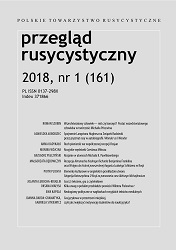Langston Hughes’ Racial Perspective on the Soviet Union Presented in I Wonder as I Wander
Langston Hughes’ Racial Perspective on the Soviet Union Presented in I Wonder as I Wander
Author(s): Agnieszka ŁobodziecSubject(s): Politics / Political Sciences, Anthropology, Language and Literature Studies, Sociology, Cultural Anthropology / Ethnology, Culture and social structure
Published by: Polskie Towarzystwo Rusycytyczne
Keywords: Soviet Union; Langston Hughes; racial relations; United States; racial identity
Summary/Abstract: Langston Hughes lived in a racially segregated country within which racialism – fortified by religious indoctrination, ontology, and pseudo-scientific assumptions – attributed inferiority to blackness and superiority to whiteness. Under these circumstances, Hughes developed racial consciousness and was likely to observe, negotiate, and assess realities beyond the United States through this prism. The article focuses on Hughes’ comparative negotiation of two contrasting geopolitical contexts i.e. the racially segregated USA and the supposedly racially progressive USSR that he elaborates on in his travelogue I Wonder as I Wander. Special focus is given to examining the ways Hughes refers to and interprets his experience of the USSR, its political system, cultural expressions, social services, customs and ethnicities from a black American racial conscious frame of reference predicated upon African American experience and folk culture. The analogies he found between the situations of black Americans and the Soviet working class and various ethnicities, particularly the special affinity he felt with the peoples of Turkmenistan and his observation of Muscovite superior and elitist attitudes towards marginalized and disenfranchised residents of impoverished regions are highlighted. Interestingly, although Langston Hughes was treated as a guest of honor in Moscow, he nevertheless ventured forth to Soviet Central Asia, where, as he put it, “the majority of the colored citizens lived”. Lastly, the extent to which Hughes’ Soviet experience may have both heightened his universalist perspectives and racial consciousness is addressed with racial consciousness approached positively in that it enriched, individualized, and deepened Hughes’ understanding of a country so different from his own.
Journal: Przegląd Rusycystyczny
- Issue Year: 2018
- Issue No: 161
- Page Range: 24-43
- Page Count: 20
- Language: English

